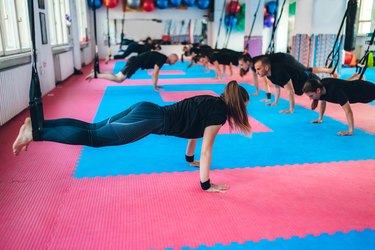
When is weight loss at 40 not a cause for celebration? When those lost pounds come from muscle tissue. According to the American Academy of Family Physicians, 40 is the age at which women can begin losing half a pound of muscle a year. Maybe it's time to get serious about getting a more toned body.
Stop Resisting Strength Training
Video of the Day
Strength training becomes increasingly important as you get older. This type of workout helps combat both slack muscle tone and decreased bone density. Resistance training helps protect your bones by "stressing" them as you work out.
Video of the Day
Strength training also provides additional benefits as people get older, notes Mayo Clinic. Lifting weights and other forms of resistance training increases metabolism, which aids in weight loss. While weight loss by itself doesn't literally tone your body, it does give you a leaner look and nudge the body fat percentage formula in the right direction.
Resistance training additionally provides some not-so-obvious benefits that become more of a factor after 40. Stronger muscles enable you to control your balance more reliably. And, of course, building muscle strength affords you the continued ability to be able to manage heavy tasks for yourself in later years.
Toned Body From Strength Training
Strength training, also known as resistance training, is the key to a toned body at any age. In terms of muscle toning workouts for females 40 and over, which type you do depends on how new you are to strength training, as well as your own personal preferences.
If you're a resistance training newbie, it's important not to overdo it in your quest for a toned body. Mayo Clinic recommends walking for at least five minutes in order to warm up your muscles. Whatever type of strength training you try, the resistance level should be just enough to tire you within 12 to 15 repetitions of each move.
For a no-equipment workout, do a cycle of moves such as squats, crunches, pushups, sit-ups, planks and pull-ups. Or you may prefer to use resistance bands, which come in a variety of strength levels and can be used on different muscle groups. Hand and ankle weights are another boost for muscle toning workouts for females, as are fitness center weight machines.
Read more: How to Build Muscle Mass Without Weights
Balancing Resistance With Cardio
Is weight loss or weight maintenance, along with a more toned appearance, a key goal? Mixing resistance training with cardio is a winning strategy when it comes to muscle toning workouts for females.
While both strength training and cardio burn calories while you're active, strength training additionally boosts your body's ability to burn them while at rest. In fact, muscle burns calories at a rate of about four times higher than fat does, which is a definite advantage for good results with any body fat percentage formula.
Finding the Right Fit
Some people find circuit training to be the most efficient way to balance strength and cardio. Fitness centers are one logical place to move between machines that specialize in cardio or resistance training. Or you can design a "circuit" for yourself, in which you break up intervals of your cardio with pushups, squats, crunches and other moves.
If you prefer to do cardio and strength-training separately, the American Council on Exercise recommends incorporating at least one weekly cardio session that is high intensity. This could be anything from a spin-cycle class to alternating slow jogging with explosive bursts of running at high speeds.
These produce more muscle-building hormones and increase muscle tissue elasticity. In addition, try to squeeze in smaller periods of active motion into your daily routine, like walking on your lunch break or taking the stairs more often.
- American Academy of Family Physicians: "After 40 - Women’s Nutrition and Metabolism Needs"
- Mayo Clinic: "Strength Training"
- Harvard Health Publishing: "Calories Burned in 30 Minutes for People of Three Different Weights"
- American Council on Exercise: "Circuit Training"
- American Council on Exercise: "Exercise for Each Decade of the Adult Lifespan"
- University of New Mexico Exercise Physiology: "Controversies in Metabolism"
Is this an emergency? If you are experiencing serious medical symptoms, please see the National Library of Medicine’s list of signs you need emergency medical attention or call 911.